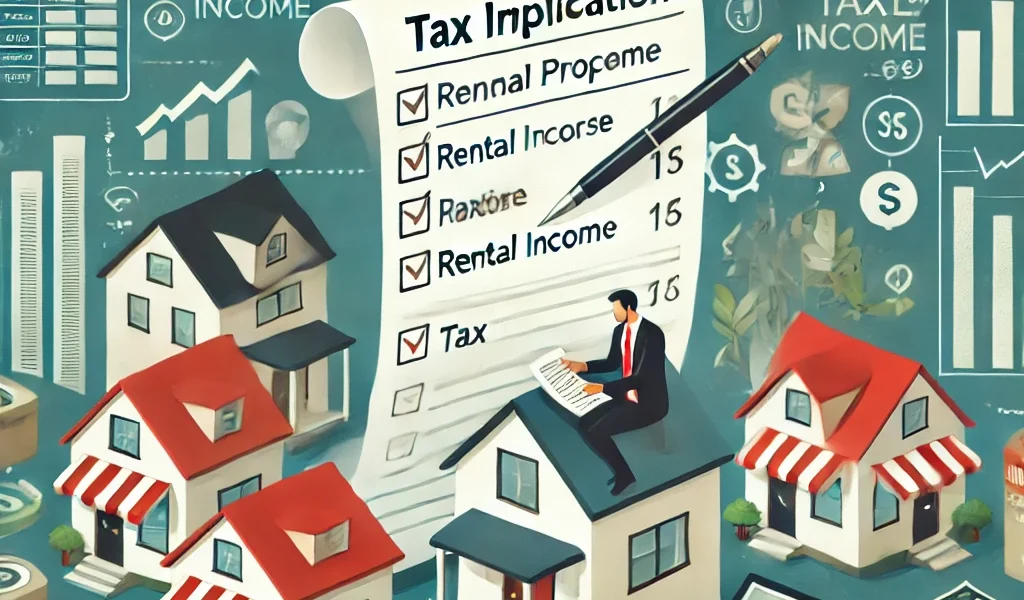Investing in multiple properties can be an excellent way to build wealth, generate passive income, and secure long-term financial stability. However, owning multiple properties also comes with tax implications that every investor must understand to optimize returns and stay compliant with tax laws. In this guide, we’ll explore key tax considerations, deductions, and strategies to minimize tax burdens while maximizing rental income.
Understanding the Taxation of Multiple Properties
1. Rental Income Taxation
All rental income you earn from properties is considered taxable by the IRS. Here’s how it works:
- Taxable Income Calculation: Rental income is taxed after deducting allowable expenses such as mortgage interest, property taxes, and maintenance costs.
- Reporting Rental Income: You must report rental income on Schedule E (Form 1040).
- Advance Rent & Security Deposits: If you receive advance rent, it must be reported in the year it is received. Security deposits that are non-refundable are also taxable.
2. Depreciation Deductions
Depreciation allows property owners to recover the cost of their rental property over time:
- The IRS allows depreciation over 27.5 years for residential properties.
- Depreciation can be deducted annually, reducing taxable rental income.
- Only the structure is depreciable, not the land.
3. Tax Deductions for Rental Property Owners
Several tax deductions can reduce your taxable income, including:
- Mortgage Interest: Interest paid on loans for rental properties is deductible.
- Property Taxes: Local and state property taxes can be written off.
- Repairs and Maintenance: Costs such as plumbing, painting, and HVAC repairs are fully deductible.
- Insurance Premiums: Homeowners, liability, and flood insurance costs are deductible.
- Utilities: If you pay for water, electricity, or gas, these expenses can be deducted.
- Legal & Professional Fees: Property management, legal, and accounting fees are deductible.
- Travel Expenses: Travel costs related to property management and maintenance can be deducted.
Capital Gains Tax on Multiple Properties
If you sell a rental property, you may owe capital gains tax. Understanding how capital gains tax works is crucial to maximizing profits.
1. Short-Term vs. Long-Term Capital Gains
- Short-Term Capital Gains: If you sell a property within one year, the profit is taxed as ordinary income.
- Long-Term Capital Gains: If you hold a property for more than one year, gains are taxed at lower rates (0%, 15%, or 20%, depending on your income bracket).
2. 1031 Exchange: Deferring Capital Gains Tax
A 1031 Exchange allows investors to defer capital gains tax by reinvesting proceeds from a property sale into another like-kind property:
- The replacement property must be identified within 45 days and acquired within 180 days.
- Capital gains tax is deferred until the new property is sold (unless another 1031 exchange is used).
- This strategy helps investors reinvest profits without immediate tax burdens.
Self-Employment Tax & Passive Income Considerations
1. Rental Income as Passive Income
Most rental income is classified as passive income, meaning it’s not subject to self-employment tax (15.3%). However, if you provide extensive services to tenants (e.g., housekeeping, meals), the IRS may classify it as active income.
2. Real Estate Professional Tax Benefits
If you qualify as a real estate professional, you can deduct rental losses against other income, but you must meet these requirements:
- Spend over 750 hours annually in real estate activities.
- More than 50% of your total working hours must be in real estate.
Property Tax Considerations for Multiple Homes
Owning multiple properties means paying multiple property tax bills. Here’s how to manage property tax efficiently:
- Primary Residence Exemptions: Many states offer tax exemptions for primary residences, reducing taxable value.
- Appeal Property Assessments: If your tax assessment is too high, you can appeal for a reassessment.
- Tax-Advantaged Locations: Consider investing in areas with lower property tax rates.
Tax Strategies to Optimize Your Rental Income
1. Hold Properties for Long-Term Gains
- Selling properties after a year allows lower long-term capital gains tax rates.
- Holding properties generates consistent rental income while avoiding frequent tax events.
2. Utilize LLCs for Liability & Tax Benefits
- Limited Liability Companies (LLCs) protect personal assets from lawsuits.
- LLCs may offer tax advantages depending on your structure (single-member LLC vs. partnership LLC).
3. Deduct Home Office Expenses
If you manage your properties from home, you may be eligible for a home office deduction, reducing your taxable income.
4. Consider Cost Segregation for Faster Depreciation
Cost segregation allows landlords to accelerate depreciation on certain components of the property, reducing tax liabilities in the early years of ownership.
5. Leverage Opportunity Zones for Tax Deferral
Investing in Opportunity Zones can defer capital gains tax while promoting economic development in underserved areas.
Conclusion
Owning multiple properties and earning rental income can be a rewarding financial strategy, but understanding tax implications is crucial. By leveraging tax deductions, depreciation, capital gains tax strategies, and legal structures like LLCs, property owners can maximize profitability while minimizing tax liabilities. Consult a tax professional to ensure compliance and take advantage of all available tax-saving opportunities.




